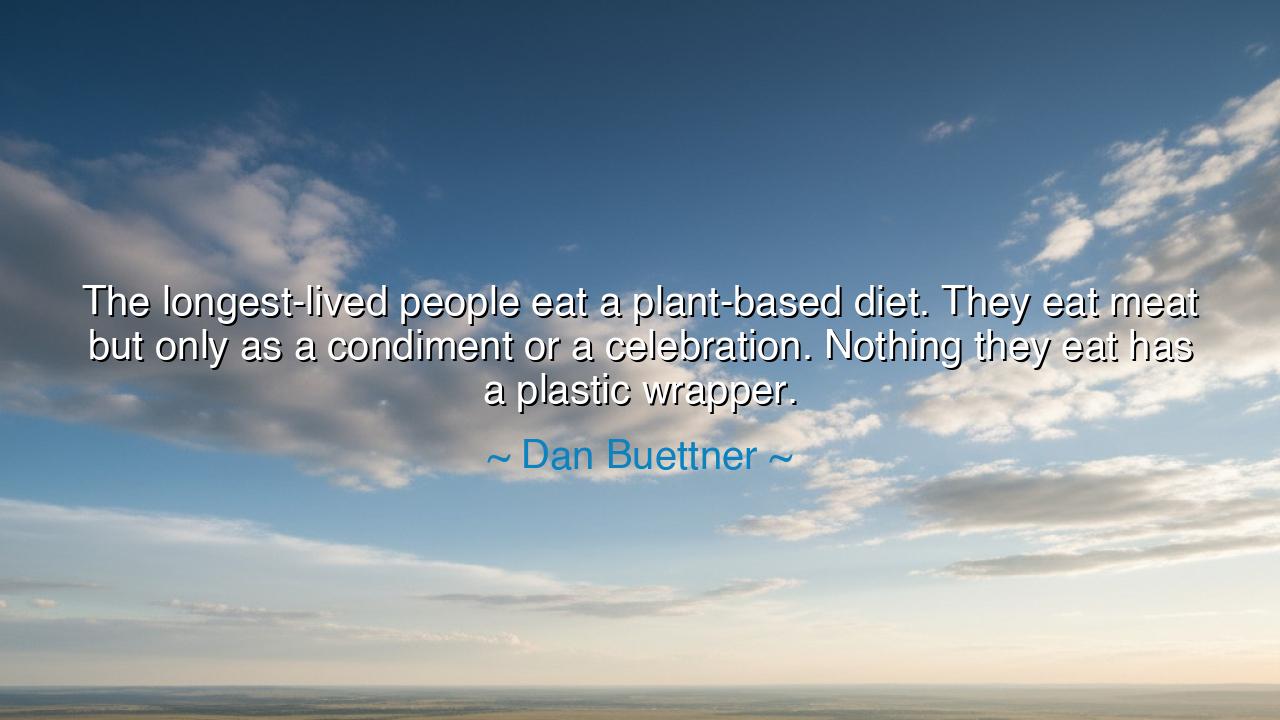
The longest-lived people eat a plant-based diet. They eat meat
The longest-lived people eat a plant-based diet. They eat meat but only as a condiment or a celebration. Nothing they eat has a plastic wrapper.






When Dan Buettner said, “The longest-lived people eat a plant-based diet. They eat meat but only as a condiment or a celebration. Nothing they eat has a plastic wrapper,” he was not merely speaking of food—he was speaking of wisdom, the kind woven into the fabric of life itself. His words draw from the Blue Zones, the sacred corners of the earth where humans live longer, not by chasing youth, but by living in harmony with nature. In this truth, we find not just the secret to longevity, but the rediscovery of balance, the forgotten covenant between body, earth, and spirit.
The ancients would have recognized this harmony immediately. For they, too, revered the earth as mother, and food not as indulgence but as communion. The farmers of old understood that to eat was to participate in the rhythm of the seasons. They ate what grew beneath their hands, what ripened under their own sun, and what perished when its time was done. Buettner’s teaching—that longevity is found in the plant-based, the humble, the unprocessed—echoes the way of our ancestors, who knew that the closer we eat to the soil, the closer we live to truth.
There is humility and celebration in his phrase, “They eat meat but only as a condiment or a celebration.” The ancients knew that the act of feasting was sacred precisely because it was rare. In moderation, meat was not a daily right but a festival of gratitude, shared among families and tribes in thanksgiving to the earth and the gods. The Japanese of Okinawa, the Sardinians of Italy, and the Nicoyans of Costa Rica—all cultures Buettner studied—carry this same reverence. Their strength comes not from excess but from restraint, from knowing that joy and health arise not from abundance, but from balance and gratitude.
And then comes his most striking line: “Nothing they eat has a plastic wrapper.” In these few words lies the great indictment of the modern age. We have covered the gifts of nature with the armor of industry, turning nourishment into product, and food into commodity. To live surrounded by plastic is to live surrounded by forgetfulness—to eat from the hands of machines rather than from the earth that bore us. The ancients would have wept to see such disconnection. For they knew that what comes wrapped in the false and the artificial cannot bring life; only that which still carries the scent of soil, the warmth of the sun, and the whisper of the wind can truly sustain the soul.
Consider the story of Diogenes the Cynic, the philosopher who cast aside wealth and possessions to live simply in a clay jar. When asked what he gained by rejecting the comforts of the city, he replied, “Freedom.” Buettner’s message is the same, spoken for a different age: that in returning to simplicity, we reclaim our freedom—freedom from disease, from vanity, from the endless hunger that modern life stirs but never satisfies. The secret of the long-lived is not hidden in laboratories or luxury diets; it lies in simplicity, in the power of the uncomplicated life.
In Buettner’s vision, food is not just fuel—it is philosophy. To eat plants, to share modestly, to celebrate rarely but fully, is to live according to the natural order. It is to recognize that the body, like the planet, thrives in diversity and perishes in excess. His teaching is not about restriction, but reverence—reverence for what is real, for what grows slowly, for what cannot be replaced once lost.
So, what lesson shall the listener take? It is this: return to the earth. Let your table reflect gratitude, not greed. Eat what is alive, what has color, what carries the memory of the sun. Save meat for sacred moments; let plants be your daily companions. Cast away the plastic, the processed, the rushed, and rediscover the joy of preparing what nature gives freely. For as Dan Buettner reminds us, the path to a long and vibrant life is not paved with luxury or novelty—it is rooted in simplicity, in living gently upon the earth, and in remembering that every bite can either honor or betray the miracle of being alive.






AAdministratorAdministrator
Welcome, honored guests. Please leave a comment, we will respond soon